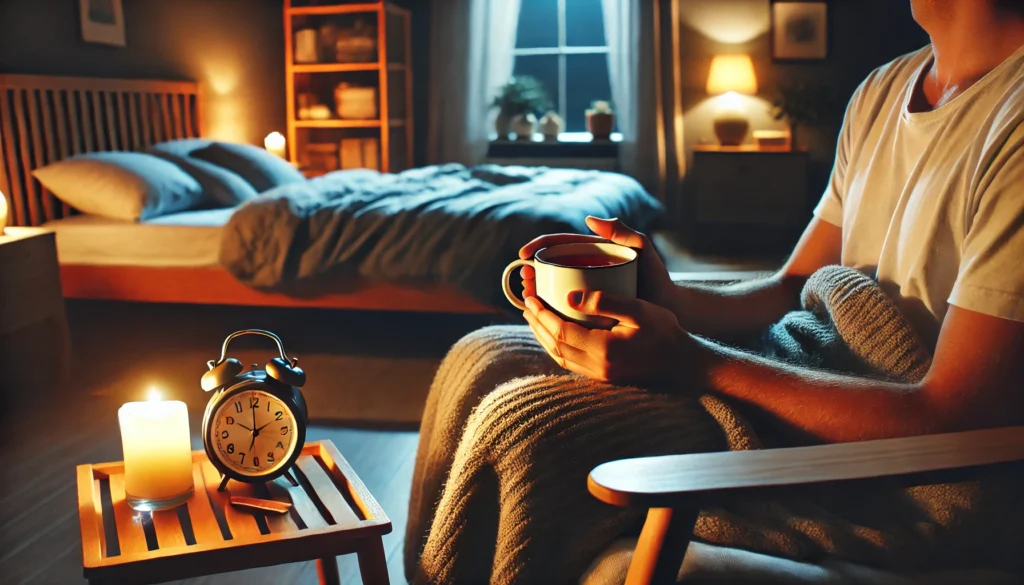Before diving into the habits that promote quality sleep, it’s essential to understand the basic science behind it. Sleep is a complex biological process that involves several stages, each serving a unique purpose. The two main types of sleep are Non-Rapid Eye Movement (NREM) and Rapid Eye Movement (REM) sleep.
You May Also Like: Benefits of Consistent Sleep Schedules Explained
The Role of NREM Sleep
NREM sleep is divided into three stages, ranging from light to deep sleep, which facilitates physical recovery and growth. During these stages, the body repairs tissues, builds bone and muscle, and strengthens the immune system. Deep sleep, in particular, is crucial for feeling refreshed and well-rested upon waking. It also plays a significant role in restoring energy levels and overall bodily health.
The Importance of REM Sleep
REM sleep, on the other hand, is crucial for cognitive functions, such as memory consolidation, learning, and mood regulation. This stage is characterized by rapid eye movements, increased brain activity, and vivid dreaming. During REM sleep, the brain processes information from the day, which aids in learning and memory retention. Additionally, REM sleep is vital for emotional health, as it helps to process emotions and reduce stress.
The Sleep Cycle and Its Impact
A typical sleep cycle lasts about 90 minutes and repeats several times throughout the night. Disrupting these cycles can lead to a feeling of unrest and fatigue. Each cycle includes a period of light sleep, deep sleep, and REM sleep, all of which are necessary for different aspects of physical and mental health. Understanding these cycles can help you appreciate the importance of uninterrupted sleep and encourage habits that support healthy sleep architecture.
Circadian Rhythms and Sleep
Our body’s internal clock, known as the circadian rhythm, regulates the sleep-wake cycle and is influenced by environmental cues like light and temperature. It plays a crucial role in determining when we feel alert or sleepy. Misalignment of this rhythm, often caused by irregular sleep schedules or exposure to artificial light, can lead to sleep disturbances. Understanding and respecting this natural cycle can enhance your ability to have a peaceful night and rest well.
The Science Behind Circadian Rhythms
Circadian rhythms are driven by a group of cells in the brain known as the suprachiasmatic nucleus (SCN), which responds to light signals from the environment. This biological clock helps regulate various functions such as hormone release, eating habits, and body temperature. Disruptions to these rhythms, such as jet lag or shift work, can significantly impact sleep quality and overall health.
Light’s Influence on Circadian Rhythms
Light exposure is a primary cue that influences circadian rhythms. Morning light exposure helps signal the body to wake up and start the day, while decreased light in the evening promotes the production of melatonin, a hormone that induces sleep. Excessive exposure to artificial light, especially blue light from screens, can interfere with this natural process, making it difficult to fall asleep.
Strategies to Align Circadian Rhythms
To align your circadian rhythms with natural light-dark cycles, try to get exposure to natural light during the day and minimize artificial light exposure in the evening. Consider spending time outside during daylight hours and dimming the lights as bedtime approaches. Establishing a consistent daily schedule and incorporating relaxation techniques can further help synchronize your body’s internal clock.

Habits to Cultivate for Better Sleep
1. Establish a Consistent Sleep Schedule
One of the most effective ways to improve sleep quality is to maintain a consistent sleep schedule. Going to bed and waking up at the same time every day, even on weekends, helps regulate your body’s clock, making it easier to fall asleep and wake up naturally. Consistency reinforces your circadian rhythm and can lead to more restorative sleep.
Benefits of a Regular Sleep Schedule
A consistent sleep schedule helps train your body to recognize when it’s time to sleep and wake. This predictability enhances the quality of your sleep by ensuring you get the necessary amount of NREM and REM sleep. It can also improve mood, cognitive function, and overall well-being, making daily life more manageable and enjoyable.
Overcoming Common Challenges
Many people struggle to keep a regular sleep schedule due to work commitments, social activities, or personal habits. To overcome these challenges, try setting a bedtime alarm as a reminder to wind down for the night. Gradually adjust your sleep and wake times by 15 minutes each day if you’re trying to reset your schedule. Prioritizing sleep over non-essential activities can also help.
Creating a Sleep Schedule Plan
Start by determining how much sleep you need to feel rested and count backward from your wake-up time to establish a bedtime. Stick to this schedule as closely as possible, even on weekends, to strengthen your circadian rhythm. Track your progress in a sleep journal to identify patterns or obstacles and adjust your plan as needed.
2. Create a Sleep-Inducing Environment
The environment where you sleep significantly impacts the quality of your sleep. Consider these tips to enhance your sleep sanctuary:
Limit Light Exposure
Darkness signals the body to produce melatonin, a hormone that promotes sleep. Use blackout curtains, eye masks, or dim lights to minimize light exposure. Keeping your bedroom dark and free from electronic devices helps signal to your body that it’s time to rest, which can improve the onset and quality of sleep.
Control Noise
Reduce noise with earplugs, white noise machines, or soundproofing solutions. Calming sounds can also help mask disruptive noises. Creating a quiet sleeping environment minimizes interruptions and allows for deeper, more restorative sleep, which can enhance overall well-being and daytime functioning.
Regulate Temperature
Keep your bedroom cool, as a lower body temperature can facilitate deeper sleep. The ideal sleep temperature is typically between 60-67 degrees Fahrenheit (15-19 degrees Celsius). Adjusting bedding or using fans and air conditioners can help maintain this temperature range, making your sleep environment more comfortable and conducive to restful sleep.
3. Be Mindful of Diet and Exercise
Your daily habits can affect how well you sleep. Consider the following:
Avoid Stimulants and Heavy Meals
Caffeine, nicotine, and large meals can interfere with your ability to fall asleep. Limit these substances, especially in the hours leading up to bedtime. Opt for lighter meals in the evening and be mindful of your caffeine intake throughout the day to help your body relax and prepare for sleep.
Nutritious Choices for Better Sleep
Eating a balanced diet rich in fruits, vegetables, whole grains, and lean proteins can support sleep health. Certain foods like cherries, almonds, and herbal teas contain sleep-promoting properties. Experiment with these foods to see if they help enhance your sleep quality and duration.
Exercise Regularly
Physical activity can promote sleep, but timing matters. Aim to complete your workout at least a few hours before bed to avoid being too energized. Regular exercise can reduce stress and anxiety, improve mood, and enhance overall sleep quality, making it an important component of a healthy lifestyle.
4. Develop a Pre-Sleep Routine
A relaxing pre-sleep routine can signal your body that it’s time to wind down. Engage in calming activities like reading, meditating, or taking a warm bath. These rituals can help ease the transition from wakefulness to sleepiness.
The Benefits of Relaxation Techniques
Incorporating relaxation techniques such as deep breathing, progressive muscle relaxation, or gentle yoga can prepare your body and mind for sleep. These practices reduce stress and anxiety, lower heart rate, and create a sense of calm that facilitates the onset of sleep.
Personalizing Your Wind-Down Ritual
Personalize your pre-sleep routine to include activities that you find soothing and enjoyable. Whether it’s listening to soft music, journaling, or practicing gratitude, choose activities that help you unwind. Consistency in your routine will reinforce your body’s sleep signals and improve your ability to fall asleep quickly.
Avoiding Stimulating Activities
Avoid stimulating activities like intense discussions, work-related tasks, or consuming distressing media content before bed. These activities can increase alertness and make it harder to relax. Instead, focus on calming and enjoyable activities that help you disconnect from the day’s stresses.
5. Limit Screen Time Before Bed
Exposure to blue light from screens can suppress melatonin production and interfere with sleep. Make it a habit to turn off electronic devices at least an hour before bedtime. If necessary, use blue light filters or apps to reduce exposure.
Understanding Blue Light’s Impact
Blue light emitted by electronic screens can trick the brain into thinking it’s daytime, delaying the release of melatonin. This disruption can make it harder to fall asleep and reduce sleep quality. Understanding the impact of blue light can motivate you to adjust your evening habits for better sleep.
Practical Tips for Reducing Screen Time
Set a specific time each evening to disconnect from screens and engage in non-digital activities. Consider implementing a household rule to keep bedrooms screen-free. Using apps that limit screen time or setting devices to night mode can also help reduce blue light exposure.
Exploring Alternatives to Screen Time
Instead of scrolling through your phone or watching TV, explore alternative activities such as reading a book, listening to an audiobook, or doing a puzzle. Engaging in non-digital activities can be both relaxing and rewarding, creating a peaceful transition into sleep.

Modern Innovations in Sleep Enhancement
As our understanding of sleep deepens, new technologies and techniques have emerged to help optimize sleep quality.
Sleep-Tracking Devices
Wearable technology, such as fitness trackers and smartwatches, can monitor sleep patterns and provide insights into your sleep quality. These devices offer valuable data, allowing you to make informed adjustments to your sleep habits.
Benefits of Sleep-Tracking Technology
Sleep-tracking devices can provide detailed information about your sleep cycles, duration, and interruptions. By analyzing this data, you can identify patterns or issues that may be affecting your sleep. This awareness can guide you in making lifestyle changes to improve your rest.
Choosing the Right Device
When selecting a sleep-tracking device, consider factors like comfort, accuracy, and features. Some devices offer additional benefits such as heart rate monitoring or integration with health apps. Research different options and read reviews to find a device that suits your needs.
Interpreting Sleep Data
Learning to interpret the data from your sleep-tracking device is crucial. Pay attention to trends over time rather than isolated nights. Use the insights to adjust your bedtime routine, exercise habits, or sleep environment to enhance your sleep quality.
Cognitive Behavioral Therapy for Insomnia (CBT-I)
CBT-I is a structured program that helps individuals change thoughts and behaviors that disrupt sleep. It’s an effective treatment for chronic insomnia and can provide long-term improvements in sleep quality.
How CBT-I Works
CBT-I involves identifying and changing negative thoughts and behaviors that contribute to insomnia. Techniques may include sleep restriction, stimulus control, and cognitive restructuring. Working with a trained therapist can help you develop a personalized plan to address sleep issues.
Advantages of CBT-I Over Medication
Unlike sleep medications, which often provide only temporary relief, CBT-I addresses the underlying causes of insomnia. It empowers individuals with skills and strategies to improve sleep long-term. This approach reduces reliance on medications and promotes sustainable sleep health.
Seeking Professional Help
If you struggle with chronic insomnia, consider seeking help from a healthcare professional trained in CBT-I. Many therapists offer virtual sessions, making it accessible and convenient. Early intervention can lead to significant improvements in sleep quality and overall well-being.
Nootropics and Sleep Supplements
Certain supplements, like melatonin, magnesium, and valerian root, are popular for promoting sleep. While these can be helpful, it’s important to consult with a healthcare professional before starting any supplement regimen, particularly if you have underlying health conditions or are taking other medications.
Exploring Common Sleep Supplements
Melatonin is a hormone that regulates sleep-wake cycles and is commonly used to combat jet lag or shift work. Magnesium supports relaxation and muscle function, while valerian root is an herbal remedy for improving sleep quality. Each supplement works differently, so understanding their effects can guide your choices.
Potential Benefits and Risks
While supplements can aid sleep, they may also have side effects or interact with other medications. It’s crucial to understand the potential risks and benefits before use. Consulting with a healthcare provider ensures that any supplement fits your health profile and sleep needs.
Integrating Supplements with Sleep Habits
Supplements should be viewed as an adjunct to healthy sleep habits rather than a sole solution. Use them in conjunction with lifestyle changes such as maintaining a regular sleep schedule and creating a sleep-friendly environment. This integrated approach maximizes your chances of achieving restful sleep.

Conclusion: Embrace the Power of Sleep
Quality sleep is essential for physical health, mental clarity, and emotional well-being. By adopting these simple habits and leveraging modern innovations, you can improve your sleep quality and wake up feeling refreshed and rejuvenated. Remember, a good night’s rest is not just about sleeping more but sleeping better. Implement these strategies tonight and embark on a journey to restful sleep and a healthier life.
With these practical tips, you can say goodnight, rest well, and embrace the power of restorative sleep.
Further Reading:
Ten Tips for a Good Night’s Sleep
8 secrets to a good night’s sleep
Important Note: The information contained in this article is for general informational purposes only, and should not be construed as health or medical advice, nor is it intended to diagnose, prevent, treat, or cure any disease or health condition. Before embarking on any diet, fitness regimen, or program of nutritional supplementation, it is advisable to consult your healthcare professional in order to determine its safety and probable efficacy in terms of your individual state of health.
Regarding Nutritional Supplements Or Other Non-Prescription Health Products: If any nutritional supplements or other non-prescription health products are mentioned in the foregoing article, any claims or statements made about them have not been evaluated by the U.S. Food and Drug Administration, and such nutritional supplements or other health products are not intended to diagnose, treat, cure, or prevent any disease.


